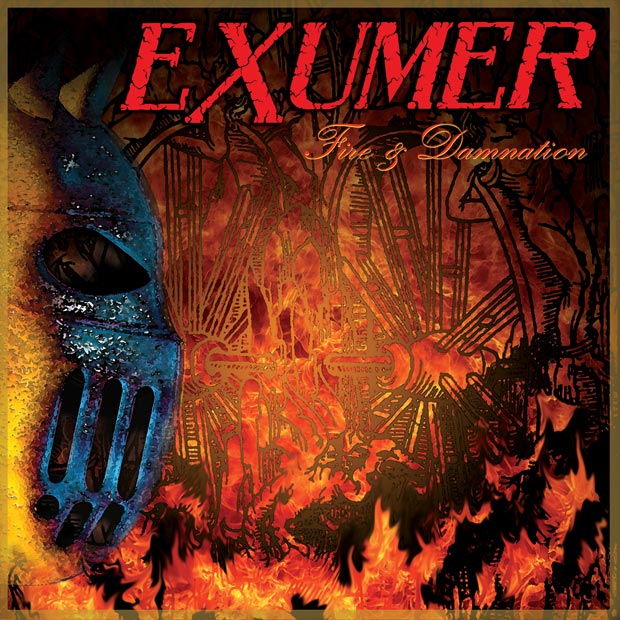Interviews
Interview with Exumer vocalist Mem Von Stein
In light of the release of Exumer’s third studio album, and first in over 25 years, I caught up with frontman and vocalist Mem Von Stein to discuss among other things, the new record Fire & Damnation, his day job and his view on why Exumer didn’t make it into the revered ranks of the Big Three of teutonic thrash metal. Von Stein and I also go on to speak about the difficulties faced by the band over the years, his retrospective views on the unholy trio’s success, the surprisingly un-metal activities he does outside of his music career, and an inane question from yours Truly. Read on and enjoy!

Check out the song: “Fire & Damnation”
In light of the release of Exumer’s third studio album, and first in over 25 years, I caught up with frontman and vocalist Mem Von Stein to discuss among other things, the new record Fire & Damnation, his day job and his view on why Exumer didn’t make it into the revered ranks of the Big Three of teutonic thrash metal. Von Stein and I also go on to speak about the difficulties faced by the band over the years, his retrospective views on the unholy trio’s success, the surprisingly un-metal activities he does outside of his music career, and an inane question from yours Truly. Read on and enjoy!
So you guys decided to reform the band during the exhibition at “Wacken Open Air 2001”. What was that defining moment during the festival that gave you guys such a thought?
Mem: We didn’t really get back together that year. Everyone was involved in other projects, especially Ray and I. The “Wacken Open Air” exhibition was like a “Thank you” to all our fans who didn’t have the chance to see Exumer with Ray and me in the line-up. I founded the band with Ray in 1985, but left the band shortly after Possessed By Fire was released and a lot of people never saw the band with that line-up. We were all there, except the drummer, Syke. It was a lot of fun, many bands were doing one-off reunion shows at that time during “Wacken,” and it definitely was the right place and time to pull off a one-off like that.
When most people think of German thrash metal, the unholy trio of Kreator, Sodom and Destruction will inevitably jump to their mind first. What kind of factors do you think helped propel those three bands to their legendary status?
Mem: I never really thought about that, but as with everything else: TIMING. It’s similar to why we became a cult band. We only recorded two albums and vanished, while the other 3 bands stayed together and continued to put out records. I think we were always respected, but maybe not as visible as other thrash bands. That has drastically changed over the years and I think we are one of the very few lucky bands that enjoy such a cult status nowadays. The band just ran out of ideas and it was just too much with the personnel changes, especially having had 3 different singers throughout the band’s lifespan.
If given the same opportunities and resources as any one of those three bands back in the ’80s when thrash metal was just starting to become popular, do you think Exumer would have been able to reach the same status?
Mem: I have been asked this question a few times over the past few years, and especially so since we started to promote this new album. I can’t really give a definite answer, but I do believe that Exumer has and had the potential to be as popular as any band in the thrash metal genre. I would not be playing in this band had I thought otherwise, and nor would I have started the band back in 1985.
Another band called Hell whom hail from the UK have also only gotten back into the metal scene recently. In fact, they have had it worse than Exumer in the sense that their first full-length album was only released last year via Nuclear Blast after having been in existence since 1982! That’s 29 years just for their debut album to be released publicly! Why do you think some quality, traditionally-styled metal bands from the ’80s underground metal scene never got the recognition they deserved in the ‘80s, but only start to get some of it in our current era when traditionally-styled metal is no longer as popular as it was 30 years ago?
Mem: We were quite popular when our records were released in the 1980’s, and just had the bad fortune to mess things up ourselves, so I don’t know if comparing our situation to Hell’s is quite adequate; but if you feel it is then it may be so.
What do you think of the creed that says bands whom take their time with writing new records generally produce quality material as compared to bands whom write a new album every year or two?
Mem: Well, I guess I have to agree with that because we took our time. The process of writing this album went in steps; we started getting ideas as early as 2008, continued to write through 2009/10 while we were touring, and finally took off in 2011 – from playing live to initiating the writing, rehearsing and recording processes of the new record within the same year. We scheduled a 3-week rehearsal session in spring earlier this year, prior to entering the studio for recording in order to play and finish writing the new songs in the rehearsal room. This way, we sounded like a cohesive unit when we went on to record the tracks in the studio and the material got a total “band/rehearsal room” vibe.

How much Exumer grown since the second full-length album from 1987?
Mem: We recorded 10 songs for the new album and I would say that it is by far the best effort with regards to the level and quality of musicianship that this band has ever had. You have to remember that we were quite young when our first two albums dropped, and now, all our experiences or technical gains over the years have been poured into this record. Having said that, I think we were able to maintain the spirit of our sound from the ‘80s with the force of our expertise of today.
You moved to the USA in late 1998. The USA is a common target for the political criticisms of ’80s thrash metal bands. Having lived there for 14 years now, do you still have anything to criticize about the political system of the USA?
Mem: Do you really want to open up this can of worms? I’m quite liberal, but you could have guessed that from the fact that I live in New York – such a cliché. Seriously though, I am a naturalized American citizen and there is a ton of stuff I see that is strange to say the least; from immigration to healthcare, to gun control to you-name-it. The flipside of it, though, is that I try to do my share and stay active in peoples’ lives and help. My undergrad and grad school majors were in social work, so you can imagine that I have some opinions about social issues.
Political subject matter is no longer as prevalent in modern thrash metal as it was during the ’80s thrash metal movement. What do you think caused such a change in mindset among thrash metal bands in general? How do you feel about such a development?
Mem: Thrash metal is and was heavily influenced by punk/HC (Hardcore) attitudes and really took off or resonated with working class youths in Germany or elsewhere. At least it did for me, so it’s not a far stretch that political themes are found in the lyrical contents of bands back then and now. I grew up with Punk and Hardcore and those styles have always been an integral part of the thrash metal attitude. The look of thrash metal is also more that of a punk/HC attitude than a traditional metal look.
Exumer still evidently sound trapped in the ’80s thrash metal movement. As seniors from a revered bygone era, what do you think of the unique cross-genre brands of thrash metal being peddled by new and young bands such as Revocation (technical death/thrash metal), Vektor (progressive thrash metal) and Havok (slightly progressive-influenced thrash metal)?
Mem: I have not heard any of the three bands you have mentioned, so I can’t say anything about what you asked. However, as a band, we just tried to continue where we left off in 1987, both recording-wise and songwriting-wise. Hence, the record has an old school vibe, but I think that is also the exact reason why it has been received so positively.
Were most of the songs on Fire & Damnation actually written during these MIA years or were they actually written and recorded over a short span of time in recent years?
Mem: No, nothing is left over whatsoever from the 1980’s or any other period. We thought it would be a special surprise for all the old school Exumer fans to hear me sing on a track from our second album (Rising From The Sea, 1987), and Paul Arkaki singing on a track from our first album (Possessed By Fire, 1986). We switched vocals on those two cuts and I think all of our old fans will appreciate these new versions of “Fallen Saint” and “I Dare You”. The rest of the songs are all brand new, other than “Waking The Fire”, which we had put out as a demo version in 2009. So, people will have 8 new cuts and two old songs in brand new versions. We wanted to showcase our old material with today’s sound and prove to people that it still holds up and doesn’t sound dated. Hence, everything other than the two re-recordings and “Waking The Fire” is new!
Check out the album preview: “Fire & Damnation”
As the lyrics for Fire & Damnation are not yet publicly available, I can only speculate what kind of subject matter they deal with. Based on the album title and track names alone, it seems to be dealing with personal challenges (“The Weakest Limb”, “Waking The Fire”, “I Dare You”) and criticism of some aspect of modern society (“A New Morality”, “Fallen Saint”) through the metaphor of death and destruction. How accurate am I?
Mem: The lyrics are important to me since I write them, but I don’t want to write lyrics that don’t have a metal feel to them. It’s not easy to come up with strong imagery and not sound too academic at the same time. I always try to write lyrics that have either strong imagery or good stories behind them.
The title track reflects what this band has been going through in the past 26+ years. It also speaks of the difficulties in making this album, and that it felt like going through fire, just to be damned on the other side. The lyrics for “The Weakest Limb” were inspired by a psychological/medical condition that is called Body Integrity Identity Disorder (BIID), formerly known as Amputee Identity Disorder, by which an affected person has a desire to cut off a body part because he or she feels that the body part feels alien and should not be part of his/her body. I was totally fascinated by the topic after reading several articles and watching some documentaries on the subject.
“Tribal Furies” is a song about the wars that are being fought in the Middle East in places like Syria, where societies are very much still governed in that way. The inspiration for the lyrics of that song came to me after reading about the earthquake that hit Japan last year and the resultant fallout from the damaged nuclear reactor. The radiation and the subsequent danger is what I mean by the “Vermin Of The Sky”.
What is the concept behind the cover art displaying a knight’s helmet at the side against a backdrop of a hieroglyphic-ish pattern with some fire burning below?
Mem: It was just a cool idea that our illustrator and friend Baptiste came up with. The mask is part of our branding and has to be somewhere on the cover art. It has the fire and scenes of damnation, you’ll see it when you have the album cover in front of you.
Who did the artwork?
Mem: His name is Baptiste Treton and he has been a friend of ours since the 1990’s. He is originally from France but moved to Vietnam with his wife where he lives today.
How long more do you foresee yourself being in the music industry to earn part of your monthly income?
Mem: The band pays for itself. We make some money from it, but it does not pay for my mortgage at the moment. We will have to tour a whole lot more to start living solely from the band’s revenue.
Do you hold a very un-metal day job?
Mem: I supervise a team of social workers whom assist families with medical and developmental problems for a non-profit agency in NYC. It is inspirational for my music. The rest of us have jobs connected to music such as guitar teacher, metal bar owner, drum store owner, etc.
If you ever quit making music as part of your career, will you consider wearing a shirt that reads “Life” on the front and give out lemons to passers-by at some random street corner in New York City?
Mem: Actually, I already did that. Seriously though, I have worked with the mentally ill homeless population on the Upper West Side in Manhattan for nearly 5 years.
-

 Alternative/Rock16 hours ago
Alternative/Rock16 hours agoThe V13 Fix #010 w/ High on Fire, NOFX, My Dying Bride and more
-

 Hardcore/Punk1 week ago
Hardcore/Punk1 week agoHastings Beat Punks Kid Kapichi Vent Their Frustrations at Leeds Beckett University [Photos]
-

 Culture1 week ago
Culture1 week agoCirque Du Soleil OVO Takes Leeds Fans on a Unique, Unforgettable Journey [Photos]
-

 Alternative/Rock6 days ago
Alternative/Rock6 days agoA Rejuvenated Dream State are ‘Still Dreaming’ as They Bounce Into Manchester YES [Photos]
-

 Music2 days ago
Music2 days agoReclusive Producer Stumbleine Premieres Beat-Driven New Single “Cinderhaze”
-

 Culture2 days ago
Culture2 days agoDan Carter & George Miller Chat Foodinati Live, Heavy Metal Charities and Pre-Gig Meals
-

 Indie1 week ago
Indie1 week agoMichele Ducci Premieres Bouncy New Single “You Lay the Path by Walking on it”
-

 Alternative/Rock1 week ago
Alternative/Rock1 week agoWilliam Edward Thompson Premieres His Stripped-Down “Sleep Test” Music Video











